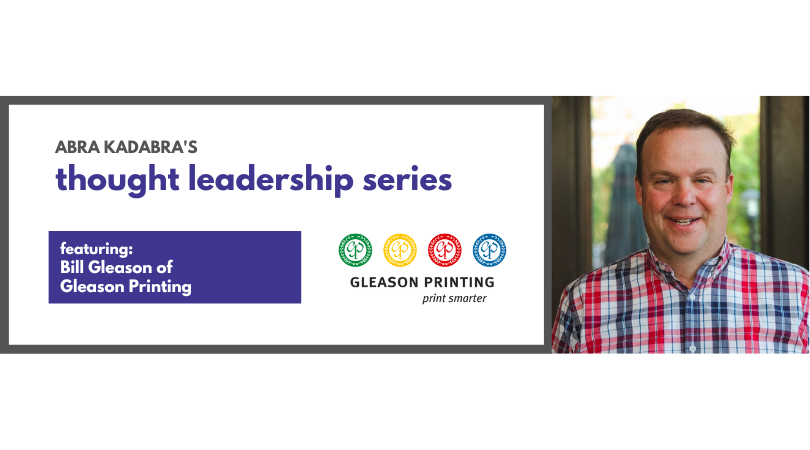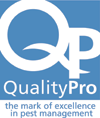Bill Gleason “never, ever, ever” planned to work for his family’s printing company.
In fact, the jobs he held as a young adult were just about as far from printing as you could get. He was a ski instructor. A caddy at a country club. And he even ended up working as a caddy master overseeing a crew that spanned a wide variety of age ranges.
“There’s a reason that someone is a caddy at age 40,” Gleason joked. “It’s because the cash is good but you don’t want to have a real job.”
At age 23, Gleason decided that he was ready for a job change himself. He started interviewing and received a few offers so he decided to sit down with his father and talk through his options. One of the positions sounded interesting, he told his dad, but it only had funding for a year and a half. Another job also seemed promising, but he would have to relocate and work his way up the ladder.
Then his father threw another choice into the mix, one he really didn’t see coming.
“He told me, ‘hey, here’s the deal. One of my employees was in a car accident yesterday. I need somebody now who I can trust and you already understand the work that we do,’” Gleason recalled. “And that’s how I ended up here.”
Twenty-five years later, Gleason is now the president and owner of Minneapolis-based Gleason Printing, the company his grandfather founded 80 years ago. While lots of things have changed in the printing business since the early days, Gleason remains committed to the principles that have made his company so successful: quality printing, fast turnaround time and exceptional customer service.
After going through a major staffing change and revamping many of their business processes several years ago, Gleason got involved in Ramsey County’s Economic Gardening Program (now called the CEO Next Business Institute). In the program, which was created as a resource for second stage businesses seeking to scale up, he started to gain a deeper understanding of core values, especially as they relate to hiring.
“I learned a lot about why company core values are important, why you hire to core values and if someone doesn’t meet all the core values, can they adapt to them over time?” he said. “What we’ve found is nine times out of 10, people don’t adapt to the core values. It’s kind of like changing a spouse. If you can’t change a spouse, how are you going to change an employee?”
About four years ago, Gleason began the process of creating a set of core values for Gleason Printing using the knowledge he gained from the CEO Next Program along with concepts from Gino Wickman’s Entrepreneurial Operating System. Now, when he interviews job candidates, he is able to refer to the core values to help determine if the individual is a good fit. He also uses a tool called Predictive Index to see how their core values align with the company’s.
Having this element in place has helped Gleason streamline the interview process and clarify exactly what he’s looking for in a new hire. It’s been a win-win for everyone: he gets employees whose values match up with Gleason Printing’s and the employees get to be part of a team where they can grow, thrive and shine.
“We spend a third of our day at work, if not more,” he said. “And because of that, you’d better like the place that you’re working.”
If you’re looking to craft a set of core values that can help guide your hiring decisions, here’s a look at a few of the ones Gleason has in place, and what they mean in terms of the company’s day-to-day work culture:
- We have integrity: For Gleason, trust and integrity go hand in hand. And it all starts with him. “There are a lot of business owners who will come and go as they please and they’ll say ‘well, I’m the owner and I can do what I want,’” he said. “That’s true, but I have a job to do and if I’m going to be gone, I let people know that I’ll be gone and why I’ll be out. That’s how my team knows that they can trust me.”
- We produce high-quality work: Gleason makes sure his employees understand that when mistakes happen – which they inevitably will – it’s on all of them to be part of finding a solution. “If something isn’t up to our standards, we’ll redo the work,” he said.
- We’re growth oriented: “Everyone has to be willing to grow,” Gleason said. “And those are the conversations where we say ‘we’re busy. Can we do this job for this person?’ We’ve found that there are plenty of other companies who will take the work if we don’t, and if you’re not willing to help people get things done, they’ll go somewhere else.” By finding employees who share a growth mindset, Gleason has been able to put his company in the position to scale up without sacrificing quality and service.
In addition to creating core values, here are a few of Gleason’s other thoughts on hiring new team members and expanding your business as a whole:
- Look for people who share similar personality traits: There’s nothing more aggravating than having to work alongside someone whose personality is diametrically opposed to yours. “You have to be willing to figure out who you’ll work best with,” Gleason said. “If someone is really aggressive and you’re not, you’re probably going to get frustrated in the long run.” And just because someone checks all the boxes and seems like an absolute rock star on paper doesn’t mean that person is going to mesh well with you and your team. That’s why it’s important to take your time in finding the best fit for your company. Ask yourself if you need to hire an expert with a specific hard skill set or if it’s OK to find someone who may not know all the ins and outs of the job but is eager to learn. If you don’t put forth the effort in thinking these things through, you could end up with a revolving door of employees. And those costs can add up fast in terms of both time and money!
- Don’t be afraid to work hard – but don’t recreate the wheel, either: No one wants to be stuck at work 24/7, but if you’re looking to grow your company, sometimes it has to be done. “Going from one person to two people isn’t that hard, but getting to four is really hard because of the cash it takes to do it,” Gleason said. “Then getting above 10 and 20 people is the next hurdle and each of those steps is so much harder and communication gets more difficult.” But as you grow, make sure that you’re making note of all the processes you put in place so they can be replicated in the future. That way, when employees leave the company – which will happen – they’re not taking all their knowledge with them. Work hard, but work smart!
- Turn to your local business community: Being part of the CEO Next program was a true “game changer” for Gleason. It gave him the opportunity to network with other presidents and CEOs and get a fresh perspective on what goes on in other industries. “Even though no one else is in the printing business in the group, we’ve all seen the problems other people are currently having,” he said. “And we can share with each other what we did to get through that problem ourselves.” In other words, it’s OK to ask for help – most people are more than willing to give it to you because they want to see you succeed as well!
Abra Kadabra Environmental Services is proud to share the wisdom of business owners from our community through our thought leadership series. If you’d like to be featured, click here.







